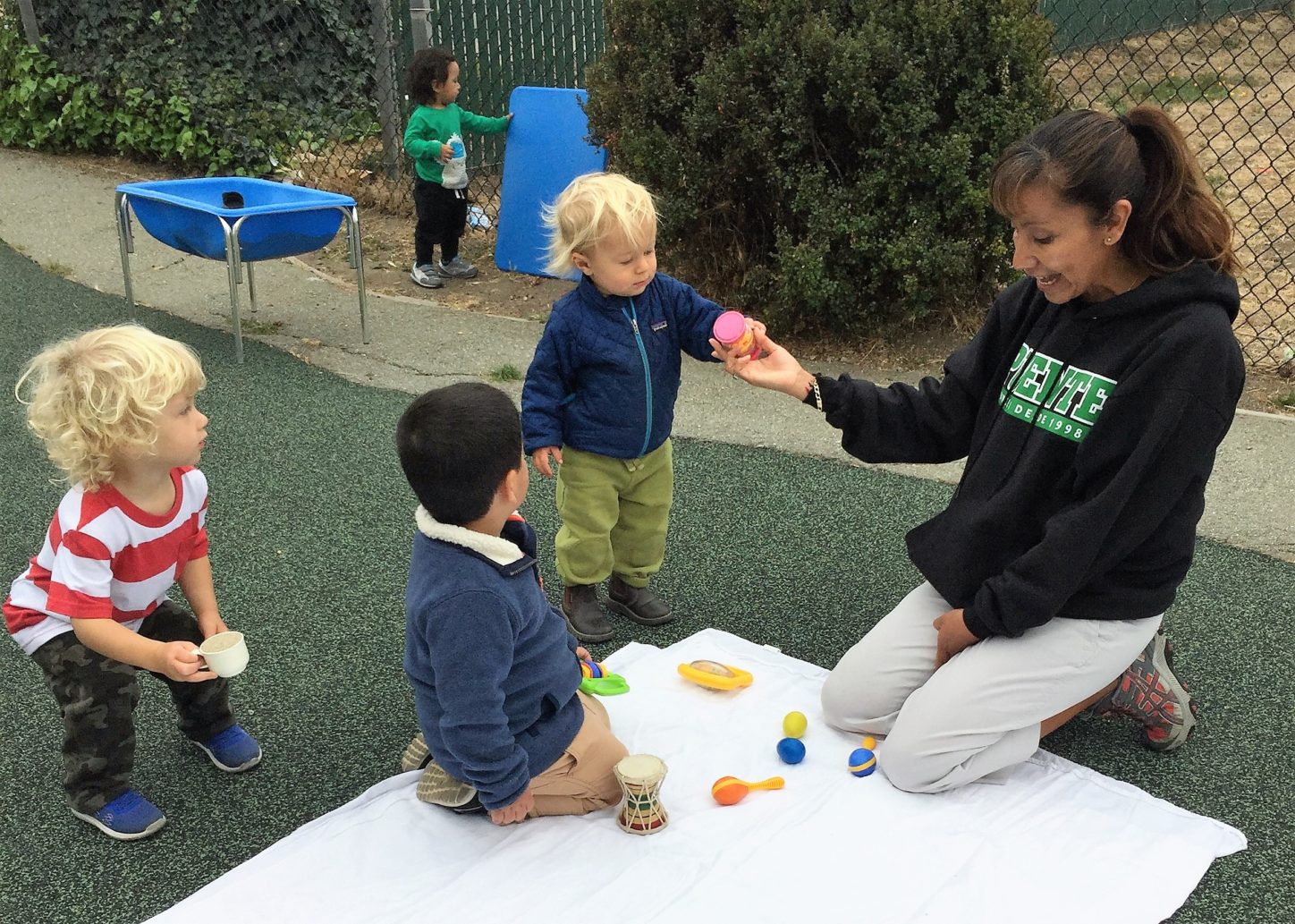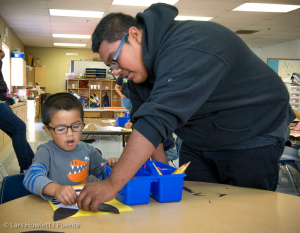
October 10 was a big day for eight children in the South Coast community. Puente quietly opened its first-ever parent cooperative preschool for children aged 18-36 months. From now through the end of the school year, four days a week, the kids attending Puente’s pilot program get to play messily and joyfully, sing, shout, read, and learn English and Spanish under the guidance of child development specialists.
The new co-op, known as Sueños Unidos (or United Dreams in English), is housed within Puente’s own childcare center for its first year while Puente seeks funding to move it to a larger dedicated space in 2018. It represents a major leap forward for daycare in Pescadero, which has no consistent, affordable licensed care facility.
“We’re really excited. So many people have put their hearts into this, and finally it feels like this dream is coming true,” says Arlae Alston, Family Engagement Project Manager for Puente.
The pilot program is overseen by two accredited teachers (one full-time, one part-time); a committee of local parents, and Alston herself. Funding for this program comes from the Heising-Simons Foundation, which continues to support the South Coast Family Engagement Initiative, a partnership between Puente and the La Honda-Pescadero Unfied School District, and First 5 of San Mateo County.
Puente has never been afraid to experiment. Its team opened a health care clinic in Puente’s own offices with funding from the San Mateo County Health System because the need was so great and there were no other suitable buildings in town. The parent co-op is a similarly creative solution to a serious need. Children older than 3 years have access to two quality preschools through the La Honda-Pescadero Unified School District. But the working parents of younger children, particularly Spanish-speaking parents, have no choice but to place their younger kids with an informal network of home childcare providers.
Many, if not all of the caregivers are passionate about childcare and child development and until recently they lacked the formal training, resources, and facilities to offer their young charges the enriched formative experience they’ll need to prepare for the social dynamics of preschool. When they get to preschool, the children may also lack the English language skills of their peers– a difference you can see by the age of three.
“Children deserve to play outside, and to be surrounded by physical beauty,” says Alston. “This is a place where kids can explore safely and the adults responsible for them don’t have to worry about the dogs next door and the truck coming in to deliver a load. We will also provide food, so parents don’t have to worry about packing lunch.”
For those unfamiliar with a parent co-op preschool, it is typically a school administered and maintained by parents with a teacher or teachers responsible for educating the preschoolers. At Sueños Unidos, parents are responsible for the childcare routines during the school day while they learn child development from the teachers.
The dream of a free, bilingual parent co-op came together very quickly this summer when Puente partnered with Family Connections, a nonprofit in San Carlos that provides educational services to low-income families. Together with Puente, they applied for and received a grant from First 5 San Mateo County.
Linnea Hoffman leads a committee of local parents who help run the co-op. Alston recruited them all back in June. Hoffman is a stay-at-home mom with two year-old son.
“My son is at an age where I can’t afford daycare and I don’t have family around here I can leave him with. There’s a solution to not having reliable people to watch your children, and I wanted to be a part of that for people here,” she says.
But Hoffman never dreamed that her son would actually be one of the children to benefit from enrolling in the co-op – she thought it would take years. Now she and the other parents on the committee take turns volunteering as teacher’s aides during co-op hours, from 8 a.m. to 12 p.m.
At the end of each day, when parents come to pick up their children, the teachers sit down and talk with them for 30 minutes about what happened during the morning. The idea is to learn about best practices: the mothers come away with new skills on everything from language development to how to defuse conflicts.
Most of the parents on the co-op committee are Spanish-speaking. Several are informal local caregivers who want to be part of creating a professional daycare setting. Some are interested in pursuing professional credentials.
Under Alston’s guidance, the committee has set policy for the co-op and interviewed the teachers Puente hired. They also came up with the name Sueños Unidos. Hoffman explains the meaning behind it.
“We all really want the same things for our children and our community’s children. And it’s been fun to think about ways that our kids’ needs can be best met.”
Working and learning together, these parents and their children will form the newest cohort of families who can reach across cultural lines to work for common cause.
“There are two communities here – English-speaking and Spanish-speaking – and they don’t always seem to come together,” says Alston. “We want to provide a space where they have something in common, so they can get to know each other and trust each other.”
And that’s not all. The parents enrolled in the co-op will be required to participate in one ‘Family Night’ per month, instructional workshops for parents to learn about important topics. For example, Puente will bring in an expert to discuss nutrition; a dentist will talk about dental health; and another expert will share tips on positive discipline. The Family Nights are modeled after a highly successful program Puente already offers to parents who want to practice reading with their kids (Raising a Reader) and invest time in their development.
Puente will offer a second monthly workshop for any local parents not in the co-op, which will be a repeat of the first one.
“One of the big goals is to continue to send a message that parents are the first teachers in their children’s lives. We are here to provide tools and remind them of that – they are the ones who hold the power,” says Alston.
In addition to Raising a Reader / Family Nights and the parent co-op, the Heising-Simons Foundation supports Storytime on Wheels, a toy lending library, and Puente’s training sessions for childcare providers. Alston also personally meets with caregivers once a month to continue talking about child development, and she has one-on-one meetings with families to talk about supporting children with special needs.
Hoffman’s son has gone from the world of a stay-at-home kid to a world of learning through play. He and the other kids get to water real pumpkins, finger-paint, play with clay, sand, and even cook. And Hoffman gets to be part of something important, to pioneer a program that has already changed her life and could one day have a big impact on her community.
“Interacting with these other women is amazing, I really look forward to it every day,” she says.
Want to get involved with the parent co-op? Contact Arlae Alston for more information.



